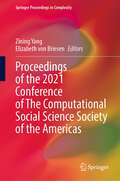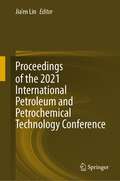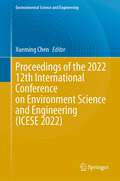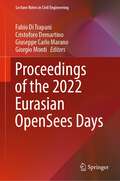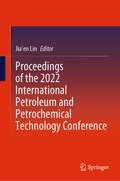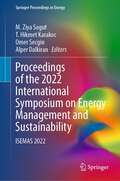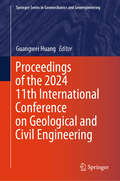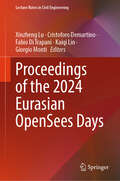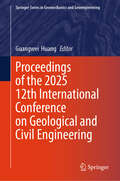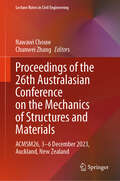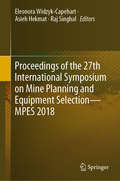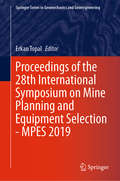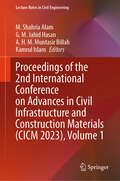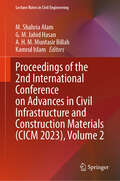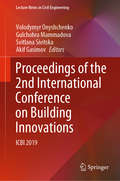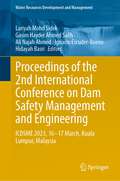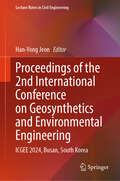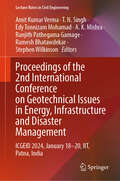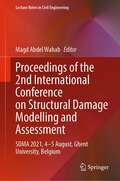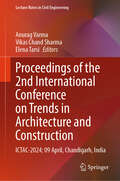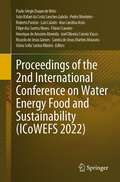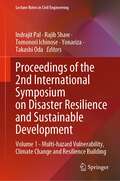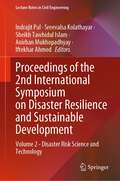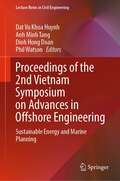- Table View
- List View
Proceedings of the 2021 Conference of The Computational Social Science Society of the Americas (Springer Proceedings in Complexity)
by Zining Yang Elizabeth Von BriesenThis book contains a selection of the latest research in the field of Computational Social Science (CSS) methods, uses, and results, as presented at the 2021 annual conference of the Computational Social Science Society of the Americas (CSSSA). Computational social science (CSS) is the science that investigates social and behavioral dynamics through social simulation, social network analysis, and social media analysis. The CSSSA is a professional society that aims to advance the field of computational social science in all areas, including basic and applied orientations, by holding conferences and workshops, promoting standards of scientific excellence in research and teaching, and publishing research findings and results.
Proceedings of the 2021 International Petroleum and Petrochemical Technology Conference
by Jia’en LinThis book is a compilation of selected papers from the 5th International Petroleum and Petrochemical Technology Conference (IPPTC 2021). The work focuses on petroleum & petrochemical technologies and practical challenges in the field. It creates a platform to bridge the knowledge gap between China and the world. The conference not only provides a platform to exchanges experience but also promotes the development of scientific research in petroleum & petrochemical technologies. The book will benefit a broad readership, including industry experts, researchers, educators, senior engineers and managers.
Proceedings of the 2022 12th International Conference on Environment Science and Engineering (Environmental Science and Engineering)
by Xueming ChenThis book consists of selected and presented papers from the 2022 12th International Conference on Environment Science and Engineering (ICESE 2022), which was held in Beijing, China, during September 2–5, 2022. The conference brought together innovative academicians and industrial experts in the field of environmental science and engineering in a common forum to promote their research and developmental activities. It also facilitated interchanging scientific information between researchers, developers, engineers, students, and practitioners working abroad. The book includes topics such as environmental sustainability, sustainable cities, environmental restoration and ecological engineering, water resources and river basin management, water treatment and reclamation, air pollution and control, atmospheric physics, carbon capture and storage, waste minimization, and resource management, among others. This book is a valuable reference for those who work in these fields in academia and industry.
Proceedings of the 2022 Eurasian OpenSees Days (Lecture Notes in Civil Engineering #326)
by Giorgio Monti Giuseppe Carlo Marano Cristoforo Demartino Fabio Di TrapaniThis book highlights the latest advances, innovations, and applications in the field of structural and geotechnical engineering, as presented by leading international researchers and engineers at the 2nd Eurasian Conference on OpenSees—Open System for Earthquake Engineering Simulation (EOS), held in Turin, Italy, on July 7–8, 2022. The conference was meant to give an overview on the latest developments made with the OpenSees framework as well as to present research and practical outcomes in which OpenSees plays an important role. Conference topics cover cutting-edge applications of OpenSees in the field of structural and geotechnical engineering, the development of new elements and materials, and also the development of new pre- and post-processors. The contributions, which were selected by means of a rigorous international peer-review process, present a wealth of exciting ideas that will open novel research directions and foster multidisciplinary collaboration among different specialists.
Proceedings of the 2022 International Petroleum and Petrochemical Technology Conference
by Jia’en LinThis book is a compilation of selected papers from the 6th International Petroleum and Petrochemical Technology Conference (IPPTC 2022). The work focuses on petroleum & petrochemical technologies and practical challenges in the field. It creates a platform to bridge the knowledge gap between China and the world. The conference not only provides a platform to exchanges experience but also promotes the development of scientific research in petroleum & petrochemical technologies. The book will benefit a broad readership, including industry experts, researchers, educators, senior engineers and managers.
Proceedings of the 2022 International Symposium on Energy Management and Sustainability: ISEMAS 2022 (Springer Proceedings in Energy)
by T. Hikmet Karakoc M. Ziya Sogut Alper Dalkiran Omer SecginThe International Symposium on Energy Management and Sustainability (ISEMAS) is a multi-disciplinary symposium that presents research on current issues in energy efficiency, social awareness, and global climate change. The conference provides a platform offering insights on the latest trends and innovations in energy management and the impact of sustainability on energy management processes. In this context, it aims to bring together sectoral, scientific, and demand-related elements in the field of energy. ISEMAS allows researchers, scientists, engineers, practitioners, policymakers, and students to exchange information, present new technologies and developments, and discuss future direction, strategies and priorities that improve environmental sustainability.
Proceedings of the 2024 11th International Conference on Geological and Civil Engineering (Springer Series in Geomechanics and Geoengineering)
by Guangwei HuangThis book is a collection of peer-reviewed and presented papers from the 2024 11th International Conference on Geological and Civil Engineering. The event was held in Matsue City, Japan, March 15–17, 2024, which provided a platform for researchers, engineers, academicians, as well as industrial professionals from all over the world to present their latest research results and development activities in geological and civil engineering. As a result, various topics were discussed in this book, including geological engineering, geotechnical engineering, civil and structural engineering, bridge engineering, building structure and bridge engineering, building technology, cartography and geographic information system, coastal engineering, surveying and geo-informatics, surveying and photogrammetry, tunnel, subway construction, underground facilities, and urban planning. The research outcomes included in this book are useful for better understanding what issues geological and civil engineering researchers are currently concerned with and what are frontiers in research approaches and technology advancement to meet the challenges today. It also provided various hints and inspirations for young researchers and engineers to pursue excellence.
Proceedings of the 2024 Eurasian OpenSees Days (Lecture Notes in Civil Engineering #638)
by Giorgio Monti Xinzheng Lu Cristoforo Demartino Fabio Di Trapani Kaiqi LinThis book encapsulates the state-of-the-art advancements and methodological innovations in structural and geotechnical engineering using OpenSees, as detailed by esteemed international scholars and practitioners at the 6th Eurasian Conference on OpenSees (EOSD), held in Beijing, China, on June 24-25, 2024. The event, following a two-day course with more than 100 attendees, was dedicated to examining recent progress and applications within the OpenSees framework. The book delves into a spectrum of topics, such as the deployment of OpenSees in structural and geotechnical projects, the development of novel computational elements and materials models, and enhancements in the software&’s pre and post-processing capabilities that improve simulation accuracy and user interaction. Each paper is rigorously vetted through a comprehensive international peer-review process, ensuring the inclusion of high-quality, impactful research. The technical content presented extends beyond mere applications, offering detailed discussions on the integration of new numerical modeling techniques, the validation of complex material models under seismic loading, and the optimization of simulation workflows for enhanced scalability and efficiency. Moreover, this book serves as a critical resource for identifying emerging research trajectories and facilitating partnerships among experts in OpenSees.
Proceedings of the 2025 12th International Conference on Geological and Civil Engineering (Springer Series in Geomechanics and Geoengineering)
by Guangwei HuangThis book presents selected papers from 2025 12th International Conference on Geological and Civil Engineering, held in Sapporo, Japan, March 7-9, 2025. The event aims to provide opportunities for the delegates to exchange new ideas and application experiences face to face, to establish business or research relations, and to find global partners for future collaboration. The recent developments in the area of geological and civil engineering are briefly discussed. The topics covered in this book include seismic response and liquefaction modeling, pavement materials and roadway stabilization, advanced design, optimization, and evaluation for concrete and structural systems, intelligent sensing and data-driven solutions for civil infrastructure. The book will be useful for researchers and scholars who are working in the field of geological and civil engineering.
Proceedings of the 26th Australasian Conference on the Mechanics of Structures and Materials: ACMSM26, 3–6 December 2023, Auckland, New Zealand (Lecture Notes in Civil Engineering #513)
by Nawawi Chouw Chunwei ZhangThis book presents peer reviewed articles from The 26th Australasian Conference on the Mechanics of Structures and Materials (ACMSM26) held in December 2023 at the University of Auckland in New Zealand. Bringing together international experts and leaders to disseminate recent research findings in the fields of structural mechanics, civil engineering and materials, it offers a forum for participants from around the world to review, discuss, and present the latest developments in the broad discipline of mechanics and materials in civil engineering.
Proceedings of the 27th International Symposium on Mine Planning and Equipment Selection - MPES 2018
by Raj Singhal Eleonora Widzyk-Capehart Asieh HekmatThis proceedings book presents research papers discussing the latest developments and findings in the fields of mining, machinery, automation and environmental protection. It includes contributions from authors from over 20 countries, with backgrounds in computer science, mining engineering, technology and management, and hailing from the government, industry and academia. It is of interest to scientists, engineers, consultants and government staff who are responsible for the development and implementation of innovative approaches, techniques and technologies in the mineral industries. Covering the latest advances in fundamental research, it also appeals to academic researchers.
Proceedings of the 28th International Symposium on Mine Planning and Equipment Selection - MPES 2019 (Springer Series in Geomechanics and Geoengineering)
by Erkan TopalThis conference proceedings presents the research papers in the field of mine planning and mining equipment including themes such as mine automation, rock mechanics, drilling, blasting, tunnelling and excavation engineering. The papers presents the recent advancement and the application of a range of technologies in the field of mining industry. It is of interest to the professionals who practice in mineral industry including but not limited to engineers, consultants, managers, academics, scientist, and government staff.
Proceedings of the 2nd International Conference on Advances in Civil Infrastructure and Construction Materials (Lecture Notes in Civil Engineering #511)
by M. Shahria Alam G. M. Jahid Hasan A. H. M. Muntasir Billah Kamrul IslamThis book presents select proceedings of the International Conference on Advances in Civil Infrastructure and Construction Materials (CICM) and provides a compendium of cutting-edge research and innovative solutions in civil engineering from around the world. This book covers a diverse range of topics from seismic resilience and smart infrastructure technologies to novel construction materials and sustainable design practices. The papers discuss the application of shape memory alloys and innovative bracing systems designed for enhanced seismic resilience; delve into advancements in low-calcium fly ash, geopolymer binders, and sustainable mix designs that promise lower environmental impacts; provide insights into the latest in structural health monitoring and AI applications that revolutionize maintenance and safety protocols; showcase the use of recycled materials in construction, advancements in low-carbon cementitious composites, and innovative waste treatment technologies; review detailed studies on the behavior of composite structures under various loads and the application of machine learning in predicting structural integrity; and show how civil engineering practices impact urban development, from transportation planning to disaster resilience. The information and data-driven inferences compiled in this book are therefore expected to be useful for practitioners, policymakers, educators, researchers, and individual learners interested in civil engineering and allied fields.
Proceedings of the 2nd International Conference on Advances in Civil Infrastructure and Construction Materials (Lecture Notes in Civil Engineering #512)
by M. Shahria Alam G. M. Jahid Hasan A. H. M. Muntasir Billah Kamrul IslamThis book presents select proceedings of the International Conference on Advances in Civil Infrastructure and Construction Materials (CICM) and provides a compendium of cutting-edge research and innovative solutions in civil engineering from around the world. This book covers a diverse range of topics from seismic resilience and smart infrastructure technologies to novel construction materials and sustainable design practices. The papers discuss the application of shape memory alloys and innovative bracing systems designed for enhanced seismic resilience; delve into advancements in low-calcium fly ash, geopolymer binders, and sustainable mix designs that promise lower environmental impacts; provide insights into the latest in structural health monitoring and AI applications that revolutionize maintenance and safety protocols; showcase the use of recycled materials in construction, advancements in low-carbon cementitious composites, and innovative waste treatment technologies; review detailed studies on the behavior of composite structures under various loads and the application of machine learning in predicting structural integrity; and show how civil engineering practices impact urban development, from transportation planning to disaster resilience. The information and data-driven inferences compiled in this book are therefore expected to be useful for practitioners, policymakers, educators, researchers, and individual learners interested in civil engineering and allied fields.
Proceedings of the 2nd International Conference on Building Innovations: ICBI 2019 (Lecture Notes in Civil Engineering #73)
by Volodymyr Onyshchenko Gulchohra Mammadova Svitlana Sivitska Akif GasimovThis book gathers the latest advances, innovations, and applications in the field of building design and construction, by focusing on new design solutions for buildings and new technologies creation for construction, as presented by researchers and engineers at the 2nd International Conference Building Innovations (ICBI), held in Poltava – Baku, Ukraine – Azerbaijan, on May 23-24, 2019. It covers highly diverse topics, including structures operation, repairing and thermal modernization in existing buildings and urban planning features, machines and mechanisms for construction, as well as efficient economy and energy conservation issues in construction. The contributions, which were selected by means of a rigorous international peer-review process, highlight numerous exciting ideas that will spur novel research directions and foster multidisciplinary collaborations.
Proceedings of the 2nd International Conference on Dam Safety Management and Engineering: ICDSME 2023, 16—17 March, Kuala Lumpur, Malaysia (Water Resources Development and Management)
by Lariyah Mohd Sidek Gasim Hayder Ahmed Salih Ali Najah Ahmed Ignacio Escuder-Bueno Hidayah BasriThis book presents peer-reviewed articles from the 2nd International Conference on Dam Safety Management and Engineering (ICDSME 2023), organized by the Malaysian National Committee on Large Dams (MYCOLD), Tenaga Nasional Berhad (TNB), Department of Irrigation and Drainage (DID) and Universiti Tenaga Nasional (UNITEN). With the theme “resilient dams for resilient communities,” the conference highlights dam safety and engineering issues by together dam professionals and experts around the world to discuss, reflect and share their experiences in addressing these issues.
Proceedings of the 2nd International Conference on Geosynthetics and Environmental Engineering: ICGEE 2024, Busan, South Korea (Lecture Notes in Civil Engineering #396)
by Han-Yong JeonThis book presents selected papers from the 2nd Proceedings of the International Conference on Geosynthetics and Environmental Engineering, ICGEE 2024, held in Busan, South Korea, covering topic areas in geosynthetic applications and sustainability; civil and structural engineering; and environmental engineering and science. The published articles cover the latest research studies with the focus of discussing the relationship between geotechnical materials and environmental engineering in depth to solve complex geosynthetics issues in civil and environmental engineering. It also highlights state-of-the-art technologies adopted by the relevant industries which are not only commercially viable but also environmentally sustainable. The content of the papers appeals to researchers and industrial practitioners working in the field of geoengineering.
Proceedings of the 2nd International Conference on Geotechnical Issues in Energy, Infrastructure and Disaster Management: ICGEID 2024, January 18–20, IIT, Patna, India (Lecture Notes in Civil Engineering #475)
by Stephen Wilkinson T. N. Singh Amit Kumar Verma Edy Tonnizam Mohamad A. K. Mishra Ranjith Pathegama Gamage Ramesh BhatawdekarThis book consists of selected papers presented at the 2nd International Conference on Geotechnical Issues in Energy, Infrastructure and Disaster Management (ICGEID 2024), held on January 19-20, 2024 at IIT, Patna, India. The papers represent the research work in the related fields of underground mining, ground control, mining geotechnics, geo-instrumentation, mine tunneling, and underground structures. It focuses on the latest technology being implemented including artificial intelligence and machine learning applications to solve challenges in mining tunneling and geotechnical structure engineering. It also highlights the state-of-the-art technologies adopted by the civil and mining industry for their commercial as well as environmental benefits. The papers are presented by an international pool of academics, research scientists, and industrial experts and therefore cater to the global audience from the field of underground engineering.
Proceedings of the 2nd International Conference on Structural Damage Modelling and Assessment: SDMA 2021, 4–5 August, Ghent University, Belgium (Lecture Notes in Civil Engineering #204)
by Magd Abdel WahabThis book comprises the select proceedings from the 2nd International Conference on Structural Damage Modelling and Assessment (SDMA 2021) held in the city of Ghent, Belgium, on 4–5 August 2021. It discusses the recent advances in fields related to damage modelling, damage detection and assessment, non-destructive testing and evaluation, structure integrity and structural health monitoring. The conference covers all research topics and applications relevant to structural damage modelling and assessment using theoretical, numerical and experimental techniques. This book is useful to scientists and engineers in academia and industry who are interested in the field of structural damage and integrity.
Proceedings of the 2nd International Conference on Trends in Architecture and Construction: ICTAC-2024; 09 April, Chandigarh, India (Lecture Notes in Civil Engineering #527)
by Anurag Varma Vikas Chand Sharma Elena TarsiThis book includes peer reviewed article from the 2nd International Conference on Trends in Architecture and Construction (ICTAC-2024) held at Chandigarh in India. It explores modernity, sustainability, technology, and education within the ever-evolving architectural landscape. This book echoes a collective dedication to fostering environmentally conscious urban practices. It navigates the symbiotic relationship between technology and architecture, shining a spotlight on the pivotal roles of AI, digital tools, and cutting-edge construction techniques. Beyond the tangible, the publication illuminates the shifting terrain of architectural education, honing in on emerging research paradigms and the integration of innovative pedagogies. Rooted in sustainability, this compendium stands as a vibrant repository of insightful contributions, nurturing an expansive dialogue on the future trajectory of architecture.
Proceedings of the 2nd International Conference on Water Energy Food and Sustainability (ICoWEFS 2022)
by Pedro Monteiro João Rafael da Costa Sanches Galvão Paulo Sérgio Duque de Brito Filipe dos Santos Neves Henrique de Amorim Almeida Joel Oliveira Correia Vasco Ricardo de Jesus Gomes Sandra de Jesus Martins Mourato Vânia Sofia Santos Ribeiro Roberta Panizio Luís Calado Ana Carolina Assis Flávio CraveiroThis book publishes some papers presented at The International Conference on Water Energy Food and Sustainability (ICoWEFS 2023), a major forum to foster innovation and exchange knowledge in the water-energy-food nexus. The topics covered embrace the Sustainable Development Goals (SDGs) of the United Nations, including Future trends in Water Security, Smart Technologies in Sustainable Energy Production Systems, Circular systems for rural and urban food and Integrated Ecosystems Management.
Proceedings of the 2nd International Symposium on Disaster Resilience and Sustainable Development: Volume 1 - Multi-hazard Vulnerability, Climate Change and Resilience Building (Lecture Notes in Civil Engineering #283)
by Rajib Shaw Indrajit Pal Tomonori Ichinose Yonariza Takashi OdaThis, conference proceeding, book contains invited articles and contributory papers from the 2nd International Symposium on Disaster Resilience and Sustainable Development, organized by Asian Institute of Technology, Thailand, on June 24–25, 2021. It includes contributions from researchers and practitioners working in the area of disaster mitigation and risk reduction for sustainable communities. The articles cover the topics such as on tools and techniques of hazard identifications, risk assessment, engineering innovations for hazard mitigation, and safe design of structures to the vulnerable systems. The content caters to research scholars, students, industry professionals, data analytics companies, re-insurance companies, government bodies and policymakers, who work in the field of hazard modeling and disaster management.
Proceedings of the 2nd International Symposium on Disaster Resilience and Sustainable Development: Volume 2 - Disaster Risk Science and Technology (Lecture Notes in Civil Engineering #294)
by Anirban Mukhopadhyay Indrajit Pal Sreevalsa Kolathayar Iftekhar Ahmed Sheikh Tawhidul IslamThis, conference proceeding, book contains invited articles and contributory papers from the 2nd International Symposium on Disaster Resilience and Sustainable Development, organized by Asian Institute of Technology, Thailand, on June 24–25, 2021. It includes contributions from researchers and practitioners working in the area of disaster mitigation and risk reduction for sustainable communities. The articles cover the topics such as on tools and techniques of hazard identifications, risk assessment, engineering innovations for hazard mitigation, and safe design of structures to the vulnerable systems. The content caters to research scholars, students, industry professionals, data analytics companies, re-insurance companies, government bodies and policymakers, who work in the field of hazard modeling and disaster management.
Proceedings of the 2nd Vietnam Symposium on Advances in Offshore Engineering: Sustainable Energy and Marine Planning (Lecture Notes in Civil Engineering #208)
by Dinh Hong Doan Anh Minh Tang Dat Vu Khoa Huynh Phil WatsonThis book gathers a selection of refereed papers presented at the 2nd Vietnam Symposium on Advances in Offshore Engineering (VSOE 2021), held in 2022 in Ho Chi Minh City, Vietnam. The book consists of articles written by researchers, practitioners, policymakers, and entrepreneurs addressing the important topic of technological and policy changes intended to promote renewable energies and to generate business opportunities in oil and gas and offshore renewable energy. With a special focus on sustainable energy and marine planning, the book brings together the latest lessons learned in offshore engineering, technological innovations, cost-effective and safer foundations and structural solutions, environmental protection, hazards, vulnerability, and risk management. Its content caters to graduate students, researchers, and industrial practitioners working in the fields of offshore engineering and renewable energies.
Proceedings of the 30th International Laser Radar Conference (Springer Atmospheric Sciences)
by Sara Tucker John T. Sullivan Thierry Leblanc Belay Demoz Edwin Eloranta Chris Hostetler Shoken Ishii Lucia Mona Fred Moshary Alexandros Papayannis Krishna RupavatharamThis volume presents papers from the biennial International Laser Radar Conference (ILRC), the world’s leading event in the field of atmospheric research using lidar. With growing environmental concerns to address such as air quality deterioration, stratospheric ozone depletion, extreme weather events, and changing climate, the lidar technique has never been as critical as it is today to monitor, alert, and help solve current and emerging problems of this century. The 30th occurrence of the ILRC unveils many of the newest results and discoveries in atmospheric science and laser remote sensing technology. The 30th ILRC conference program included all contemporary ILRC themes, leveraging on both the past events’ legacy and the latest advances in lidar technologies and scientific discoveries, with participation by young scientists particularly encouraged. This proceedings volume includes a compilation of cutting-edge research on the following themes: new lidar techniques and methodologies; measurement of clouds and aerosol properties; atmospheric temperature, wind, turbulence, and waves; atmospheric boundary layer processes and their role in air quality and climate; greenhouse gases, tracers, and transport in the free troposphere and above; the upper mesosphere and lower thermosphere; synergistic use of multiple instruments and techniques, networks and campaigns; model validation and data assimilation using lidar measurements; space-borne lidar missions, instruments and science; ocean lidar instrumentation, techniques, and retrievals; and past, present and future synergy of heterodyne and direct detection lidar applications. In addition, special sessions celebrated 50 years of lidar atmospheric observations since the first ILRC, comprising review talks followed by a plenary discussion on anticipated future directions.
